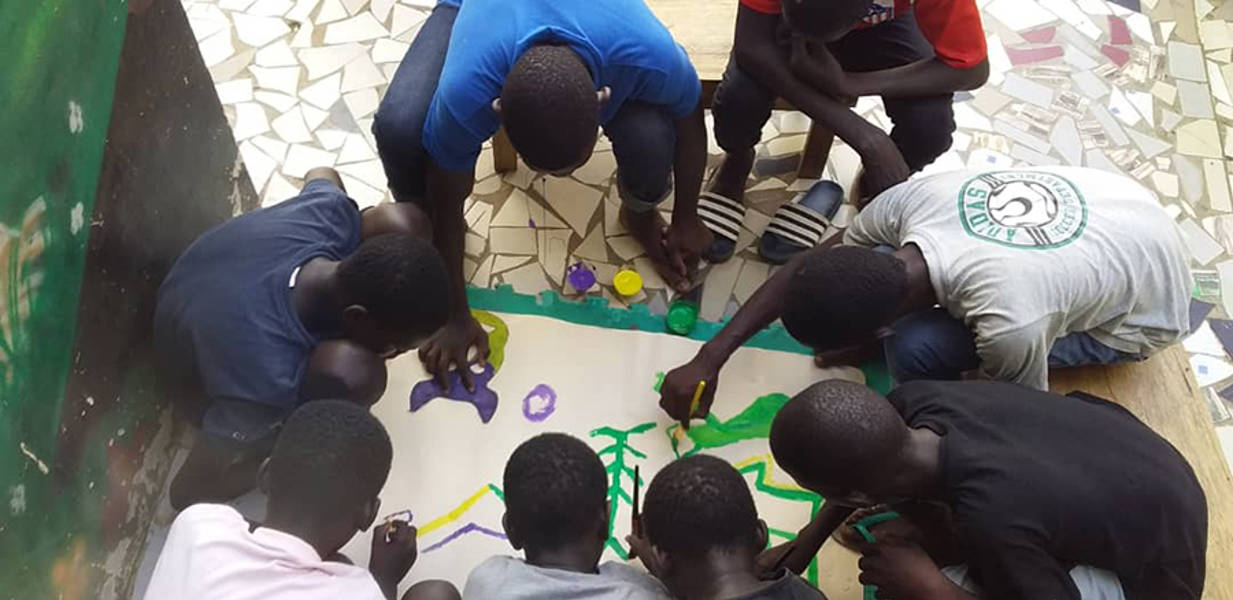
A Child-Centered Approach to Helping Children Living in the Streets in Senegal
It has been 31 years since the United Nations Convention on the Rights of the Child was ratified, and it remains the most widely supported human rights treaty in history. It has inspired governments around the world to change their laws and policies to provide stronger safeguards to protect children from abuse and exploitation while giving more children access to adequate health care, nutrition, and education.
Despite the progress that has been made, millions of children around the world are still denied their rights, from a lack of access to education, to protection from violence, and access to healthcare, clean water, and basic sanitation. Among the most vulnerable and forgotten are street children. According to UN sources, there are up to 150 million street children in the world today. During the COVID-19 pandemic, people around the world have been told to self-isolate, but this has not been an option for street children who have no safe home to go to, no soap or clean water to wash their hands, and no means of feeding themselves. The issue of street children is an increasing social problem and one that requires urgent attention, as it threatens the very fabric of society. The children living on the streets find themselves in great psychological, emotional, and physical distress, and the harmful effects of these traumas follow them into adulthood.
The Stavros Niarchos Foundation (SNF) has consistently supported organizations that help street children, and such support is at the core of the Foundation’s philanthropic mission. One of our latest grantees working for and with street children is Samu Social Senegal. According to Human Rights Watch, Dakar is home to 50,000 street children who are exploited and living in precarious conditions. SNF currently supports a medical and social intervention project for street children in the city.
Samu Social Senegal takes a child-centered approach in its interventions, aiming to restore the dignity of children in physical and social distress and those who no longer have the strength or means to ask for help. The intervention starts with mobile assistance teams on the street eight times per week (five nights and three days). They provide medical, psychosocial, and nutritional assistance to the children living on the streets. Mobile teams also respond to emergencies 24 hours a day, anywhere in the Dakar area. This work is vitally important, as street children, due to their lived experiences, have lost trust in adults and institutions. They work to mitigate this by going to meet them where they are. This is a way, on the one hand, to provide medical and social support, and on the other, to help the children to get to know the organization and, in time, to accept additional assistance so they can leave the streets.
Then, when the children are ready to leave the streets, Samu Social Senegal takes them to the shelter it runs, where the children are given psychological support by a clinical psychologist, initially in individual sessions and later in group therapy sessions, to help them overcome the traumas and hardships of living on the streets so they can start making plans for their future. The children at the shelter take part in educational, artistic, and sports activities. Those who are ready to return to their families are assisted, to make the return home smoother and safer. Lastly, Samu Social Senegal provides workshops and seminars to other organizations working with street children to share best practices and raise awareness among community leaders. This has had the effect of mobilizing decision-makers and resources for child protection in Senegal.
In the first year of the project, Samu Social Senegal has provided medical and psychosocial assistance to 3,509 children, distributed 7,104 meals in the streets, and currently has 974 children and adolescents living in its shelter. A total of 192 children were returned to their families, and 204 professionals have participated in workshops and seminars to gain a better understanding of the public they serve and the need for a multidimensional approach to helping Senegal’s street children.
The COVID-19 pandemic has greatly increased street children’s vulnerability, and Samu Social Senegal has refurbished its shelter to double its reception capacity. It is also supporting the management of reception centers set up by the Senegalese government for the medico-psychosocial care of children and training care workers in the centers to strengthen the protection of at-risk children in the streets in the context of COVID-19.
Children end up living on the streets due to a combination of factors, from familial, to social, to economic, to political factors. These children find themselves victims of indifference, violence, poverty, and sexual exploitation. Samu Social Senegal’s work is very important, now more than ever, as COVID-19 has increased the vulnerability of children living on the streets of Dakar. Its work is multifaceted and holistic, putting the best interests of street children at the heart of its interventions. Thanks to the combination of actions—street work, emergency accommodation, family reunification, and the mobilization of resources—it is making a measurable impact in the lives of street children in Dakar.
Ange Munyakazi
SNF Program Officer, Monaco